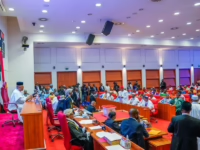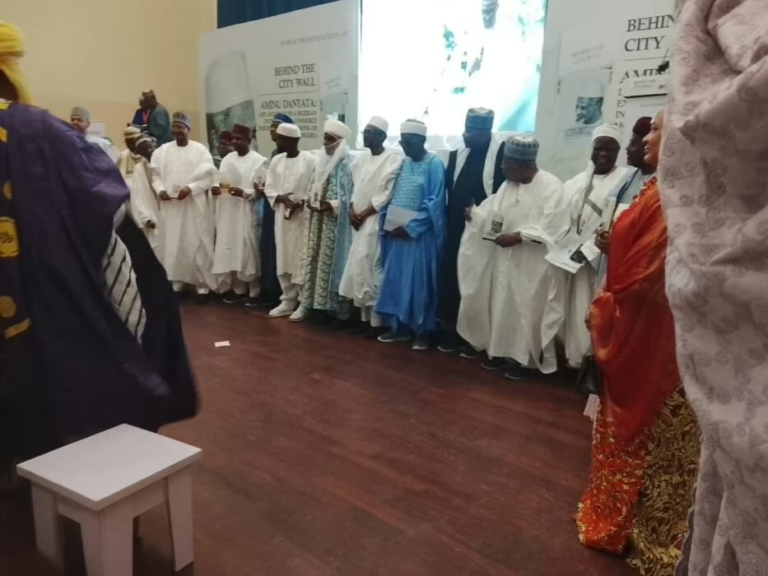His Highness Muhammadu Sanusi II, the 16th Emir of Kano, has called on Nigerians to actively document their own histories and celebrate the accomplishments of their ancestors.
The Emir made this appeal during the public unveiling of two books by Dr. Munzali Dantata, titled Behind the City Wall and Aminu Dantata: Life and Times of a Nigerian Entrepreneur, at the Yar’Adua Centre in Abuja on Tuesday.
He cautioned, “If we fail to record our history, others will do it on our behalf.”
As the Father of the Day at the event, Sanusi II emphasized the crucial role of writing and preserving history in shaping national identity. He highlighted that Kano’s rich legacy cannot be fully appreciated without recognizing the pivotal role played by its renowned business families, such as the Dantatas.
“When Munzali approached me about these books, I immediately saw the need for us to tell our own story. This is something we often neglect, especially in this region. Winston Churchill once remarked, ‘History will be kind to us because we intend to write it.’
“The narrative of Kano’s prosperity is incomplete without the chronicles of the established commercial families who have nurtured its economy for generations. While these works are biographies, they also offer a window into the broader society,” the Emir remarked.
Drawing from his own memories, the Emir recounted a poignant episode involving his late father and the late Alhaji Aminu Dantata. He shared how Dantata generously offered to clear his father’s bank loan to ease the burden of high interest rates after retirement.
“That gesture of kindness left a lasting impression on me. I never forget those who showed compassion to my family. Today, we gather not only to honor a man and his lineage but to celebrate Kano-a city founded on a tradition of excellence and a relentless pursuit of distinction in scholarship, commerce, and culture.”
Representing the Kano State governor, Abba Kabir Yusuf, the Commissioner for Information and the Commissioner for Commerce, Industry and Investment, Adamu Aliyu Kibiya, acknowledged the state government’s support for initiatives that safeguard Kano’s heritage.
In delivering the governor’s goodwill message, Kibiya lauded Dantata’s literary contribution and reaffirmed Kano’s status as a vibrant center of trade and culture.
“The books Behind the City Wall and Aminu Dantata: Life and Times of a Nigerian Entrepreneur serve as contemporary chronicles of memory, identity, and heritage.
“They remind us that Kano has long been a beacon of commerce, learning, and culture, influencing not only our state but also the broader Nigerian and African landscapes.”
Kibiya also paid homage to the late Alhaji Aminu Dantata, describing him as one of Nigeria’s foremost entrepreneurs, industrialists, politicians, and philanthropists-whose life was marked by vision, discipline, and generosity.
Former Senate President Dr. Bukola Saraki, who officiated as Chief Launcher, praised the author for his dedication to preserving the legacy of a remarkable Nigerian whose influence spans generations.
“This event is more than a book launch; it is a tribute to a great man. Alhaji Aminu Dantata was a mentor to many and a patriot who cherished this nation deeply. His story exemplifies how true greatness stems from service, humility, and unwavering commitment to others.”
Saraki shared personal reflections on his interactions with the late business titan, highlighting his humility and profound love for Nigeria.
“He often expressed sorrow over the country’s challenges. He would lament, ‘How can I be content when in the 1970s one pound equaled one naira, and today it is worth over a thousand?’ His heart truly ached for Nigeria.”
He encouraged the Dantata family to uphold the late industrialist’s legacy of service, patriotism, and entrepreneurship, describing him as a monumental figure in Nigeria’s history.
Dr. Munzali Dantata, the author, explained that his books intertwine personal and collective histories that embody Kano’s spirit of resilience and innovation.
“These two volumes tell parallel stories of a community and an individual united by a shared belief: progress begins with enterprise,” he said. “The Kano ethos, rooted in a simple truth, was imparted to me-that the prosperity of a people is inseparable from the industriousness of its citizens.”






















